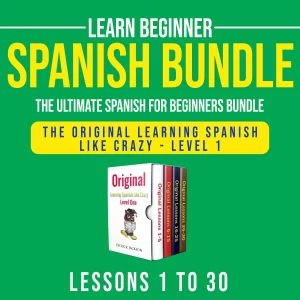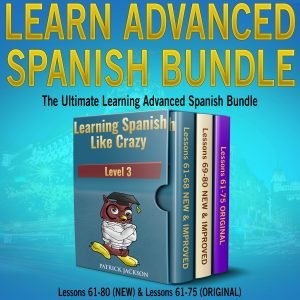Ser and estar
In Lesson 6, we introduced two irregular verbs that translate as to be. We conjugated the verb ser in Lesson 6 and indicated that estar was a “special case” with written accents and an irregular yo form. Here are the present tense forms of estar:
|
estar |
|
| yo estoy | nosotros estamos
|
| tú estás
|
|
| él
ella está Ud. |
ellos
ellas están Uds. |
Notice that only the forms inside the “boot” are irregular. There are two reasons for the written accent in the tú, él and ellos forms: pronunciation and differentiation. In regular written Spanish, readers put the stress (the tonal emphasis) on the second to last syllable. Look at no-SO-tros and es-TA-mos. Whenever the stress correctly falls on the second to last syllable, no accent mark[1] is necessary. Now look at estás, pronounced es-TAS. The stress belongs on the last syllable, and therefore a written accent is required. In addition to pronunciation concerns, the written accent in the present tense forms of estar differentiates the verb from the demonstrative adjectives and pronouns, which we will study in depth in Lesson 18. As a quick preview, esta means “this” while está means “is.” It’s the same idea as el (“the) and él (“he”), except that forms of estar are pronounced differently than look-alike demonstrative adjectives and pronouns.
Since there are two ways to express to be in Spanish, it probably doesn’t matter which one you use, right? WRONG. There are specific situations for each verb. At best, using the wrong verb will significantly change the meaning of the sentence; at worst, the sentence won’t make much sense at all. As a beginner, you’ll be creating lots of sentences that don’t make much sense, and that’s perfectly okay—but you should still try to say what you mean in a way that others understand. Otherwise, you may spend most of your time just talking to yourself! As I’ve said, grammar is a tool to help you realize your goal. Take the time now to learn the forms and uses of ser and estar, and you’ll find that both casual interactions in Spanish and the more advanced grammar we’ll study later on will come more naturally.
The following table provides rules for the use of ser and estar. In general, use ser for permanent situations and estar for temporary situations. Use ser to tell where something comes from and estar to tell where it is right now. Study this chart:
|
Use ser |
Use estar |
|
…to express a permanent inherent quality or characteristic. “The dog is black.” |
…to express a temporary state or condition. “The dog is wet.”
|
| …with a predicate nominative.[2]
“Mr. Gonzalez is my teacher.” |
…to express a temporary emotion.
“He is frustrated.”
|
| …to express origin.
“This painting is from Italy.” |
…to express location.
“We are at the mall.”
|
| …as a substitute for “take place.”
“The festival will be in Philadelphia.” |
…with muerto. Death is considered a state, even though it is permanent.
|
| …with the passive voice.
“The doors are locked.” |
…to show the result of an action.
“The house is solidly built.” |
Sometimes both verbs make sense, and the one you choose will clarify the meaning. In the sentence “She is pale,” do you mean she looks pale today and may be ill? In that case, use estar. If you mean that her skin is naturally pale, use ser. Watch how word selection alters the meaning of these sentences:
| El agua es fría.
El agua está fría. |
The water is cold. (Always, i.e. the Arctic Ocean)
The water is cold. (Not always, not all water…)
|
| Tu esposa es bonita.
Tu esposa está bonita. |
Your wife is pretty. (She’s a pretty lady.)
Your wife is pretty. (She looks pretty today.)
|
| Ud. es aburrido.
Ud. está aburrido. |
You are boring. (Potentially serious error!)
You are bored.
|
| Ella es cansada.
Ella está cansada. |
She is tiresome. (i.e. boring, annoying…)
She is tired.
|
| Yo soy viva.
Yo estoy viva. |
I am alert or I am lively. (Just a fun person all around.)
I am alive. (Like death, life is considered a temporary state.)
|
| El es borracho.
El está borracho. |
He’s a drunk. (He’s an alcoholic.)
He is drunk. (Right now) |
Your practice for this lesson should be threefold. Start out by completing the written exercises and studying. Make sure you know all of the conjugated forms of ser and estar—they will come up more frequently than any other verbs. Then, as with all other lessons, seek out “real Spanish.” After this lesson, I suggest that you try reading comics or children’s books in Spanish—they tend to have plenty of dialogue and pictures to help you understand what’s going on. When you encounter ser and estar, think about why one verb was used and not the other. (It should go without saying that if you aren’t interested in what you’re reading, look for something else!) Finally, talk to someone in Spanish, preferably someone fluent; if not, try to find someone who speaks at least a little more Spanish than you do. Try not to worry about grammar while you’re speaking—it will come gradually, especially when you read and study regularly.
Practice
Fill in the blanks using ser or estar. Make sure to use the correct conjugated form of the verb you choose. For extra credit, translate the sentences. Note: you’ll need a dictionary, even if you don’t do the extra credit!
1) Mi abuela _____________ baja.
2) Ella ________________ una mujer divertida.
3) Ella y sus hijas _______________ de Florida.
4) Yo __________________ de Florida también, pero _________________ en Nueva Jersey ahora.
5) A veces yo ________________ triste.
6) Para mi, Nueva Jersey __________________ aburrida.
7) Para mis amigos, Nueva Jersey ____________________ un lugar bonito.
8) ¿De dónde _________________ tú?
9) ¿Tú ____________________ en Nueva Jersey también?
10) ¡Ahora nosotros __________________ listos para aprender más!
Answers
1) Mi abuela es baja.
2) Ella es una mujer divertida.
3) Ella y sus hijos son de Florida.
4) Yo soy de Florida también, pero estoy en Nueva Jersey ahora.
5) A veces yo estoy triste.
6) Para mi, Nueva Jersey es aburrida.
7) Para mis amigos, Nueva Jersey es un lugar bonito.
8) ¿De dónde eres tú?
9) ¿Tú estás en Nueva Jersey también?
10) ¡Ahora nosotros estamos listos para aprender más!
My grandmother is short. She is a funny* lady. She and her children are from Florida. I am from Florida, too, but I am in New Jersey now. Sometimes I am sad. For me, New Jersey is boring. For my friends, New Jersey is a pretty place. Where do you come from?* Are you in New Jersey, too?
Now we are ready to learn more!
* Divertida may be translated as fun, amusing, funny, etc. Literally, questions 8 and 9 read, “From where are you? You are in New Jersey also?” When you translate, phrase it like a natural English sentence.
[1] Since I gave you the proper name for the umlaut (also called dieresis), I feel obliged to mention that a written accent is formally known as a tilde.
[2] A predicate nominative follows the verb to be and simply renames the subject. In the example, Mr. Gonzalez and my teacher are the same person, and therefore teacher is the predicate nominative. In the sentence “Harry Potter is a fictional character,” character is the predicate nominative.





